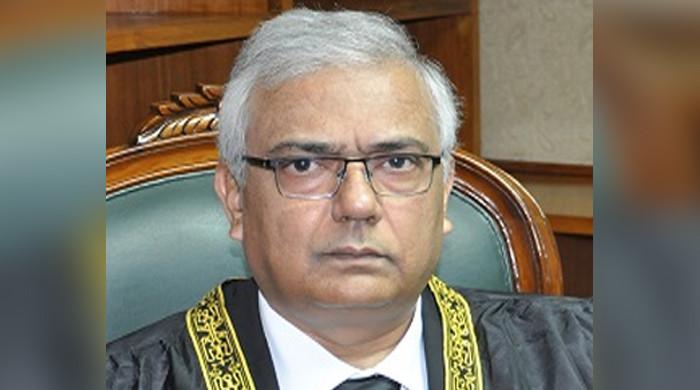
- Federal Constitutional Court formed under 27th Amendment.
- Justice Khan served as head of Constitutional Bench.
- Appointment comes after NA approves to SC Procedure Bill.
ISLAMABAD: President Asif Ali Zardari has approved the appointment of Justice Aminuddin Khan as the first Chief Justice of the newly-established Federal Constitutional Court (FCC).
President Zardari approved the appointment of Justice Aminuddin on the advice of Prime Minister Shehbaz Sharif, read a statement issued on Thursday, hours after he gave his assent to the 27th Constitutional Amendment.
A notification from the law ministry said President Zardari made the appointment under clause (3) of Article 175-A, read with Article 175-C of the Constitution. It added that it would come into effect from the date that Justice Khan took his oath.
Justice Khan, whose legal practice started around four decades back, was previously serving as the head of the now-dissolved constitutional bench, which was formed as a result of the 26th Constitutional Amendment last year.

The new court, which has been established as a result of the 27th Amendment, is set to have equal provincial representation. The president and the prime minister will play key roles in judicial appointments, while powers to hear constitutional cases of the Supreme Court will be transferred to the new court.
A crucial power of the Supreme Court, taking suo motu notices, has also been transferred to the FCC, which has been empowered to take suo motu notice upon petitions.
When the Bill to establish the court was passed in the National Assembly, Pakistan Peoples Party Chairman Bilawal Bhutto-Zardari mentioned that the judiciary will no longer have the authority to take suo motu actions, noting that the PPP and PML-N had faced “consequences” of suo motu powers.
Chief Justice Yahya Afridi, who was sworn to the coveted post on October 30, 2024, still remains the top judge; however, once his tenure ends after the stipulated three years, the senior-most judge from amongst the SC and FCC judges will become the top judge.
The judicial overhaul, part of the latest amendments, not only paved the way for dissolving the Constitutional Benches but also, through the Supreme Court Practice and Procedure (Amendment) Bill 2025, transferred the authority to constitute case-hearing benches to a three-member committee headed by the Chief Justice.
The committee will comprise the chief justice of the Supreme Court, the most senior judge, and a third judge nominated by the country’s top jurist. In the absence of any member, the chief justice may nominate another judge to serve on the committee. Decisions regarding the formation of benches by the committee will be made by a majority vote.
The retirement age of judges of the Constitutional Court will be 68 years, three years higher than that of the Supreme Court judges, who currently retire at 65.
Legal expert Hafiz Ahsaan Ahmad Khokhar mentions that the Supreme Court will continue as the final appellate forum in all civil, criminal, tax, corporate, and special law matters under Article 185.
While the newly created FCC will be vested exclusively with jurisdiction over constitutional interpretation, federal–provincial disputes, advisory opinions, and appeals arising from high court decisions rendered under Article 199.
Who is Justice Khan?
Born to a noble family of a famous lawyer of the time, Advocate Khan Sadiq Muhammad Ahsan in Multan on December 1, 1960, Justice Khan received his education from a local school in the district, according to the Supreme Court’s website.
After completing his secondary school education in the year 1977 in Multan, he secured his Bachelor’s Degree in subjects of Philosophy in the year 1981 and completed his LLB from University Law College, Multan in 1984 and a diploma in Taxation Law.
Justice Khan started practice as a junior with his father and obtained the license to practice in the lower courts in the year 1985. He enrolled as an advocate of the Lahore High Court in 1987.
Some years later, he was enrolled as an Advocate of the Supreme Court in 2001. He joined a local firm in Multan in the year 2001, till elevation remained there.
He practiced in the civil side — mainly from the trial court up to the Supreme Court — and appeared in the Supreme Court in famous and important cases relating to property, pre-emption, and matters of inheritance. These subjects remained the favourite subjects.
In 2011, Justice Khan was appointed to the Lahore High Court bench, where he soon became noted for resolving long-standing civil cases efficiently. Presiding over cases at the Bahawalpur, Multan, and Lahore benches, he contributed a series of judgments that were frequently upheld by the Supreme Court.
He was elevated to the Supreme Court of Pakistan on October 21, 2019. Notable among Justice Khan’s recent judgments is his dissenting note in the July 12 reserved seats verdict. Justice Khan was also part of the nine-member larger bench that reviewed the presidential reference filed against the hanging of former prime minister Zulfikar Ali Bhutto.
He has also made substantial contributions to legal education, serving as an examiner and lecturer at University Law College, Multan. Additionally, he has held roles on the Syndicate of several universities, including the University of Engineering and Technology, Lahore.
Discover more from Brackly News
Subscribe to get the latest posts sent to your email.



